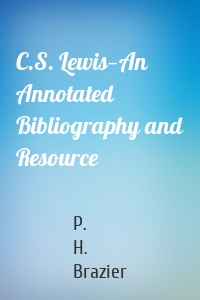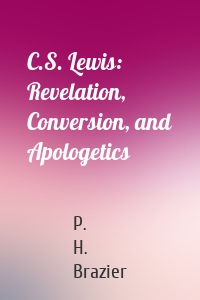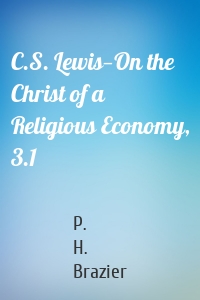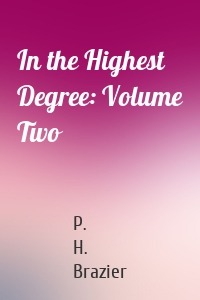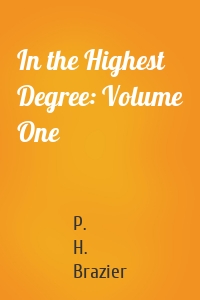P. H. Brazier
8 кн.
C.S. Lewis—An Annotated Bibliograph...
This bibliography and resource consists of a chronological introduction to the development of Lewis's works, a copious bibliography and a guide to the study of Lewis, an introductory essay on Christology in Lewis, and a glossary for those unfamiliar with some of the background and terms to Lewis's understanding of revelation and the Christ. It will be an invaluable resource for all scholars of C. S. Lewis. The bibliography stands alone but it also serves to complement the three...
| Автор | P. H. Brazier |
C.S. Lewis: Revelation, Conversion,...
This is a series of books which have a common theme: the understanding of Christ, and therefore the revelation of God, in the work of C. S. Lewis. These books are a systematic study of Lewis's theology, Christology and doctrine of revelation; as such they draw on his life and work. They are written for academics and students, but also, crucially, for those people, ordinary Christians, without a theology degree who enjoy and gain sustenance from reading Lewis's work. ...
| Автор | P. H. Brazier |
Longman’s Charity
Damaged by an attempted abortion, preyed upon by the violence of his parents' marriage, abused from the age of seven, and shut away in a mental hospital at thirteen, Paul Broadley never ceases to love the landscape he grows up in, which acts as a precursor to his salvation. But there is a serpent in that garden bent on willfully corrupting people–and yet redemption is strewn widely for those able to respond. Longman's Charity is a novel and theological parable about landscape and...
| Автор | P. H. Brazier |
C.S. Lewis—On the Christ of a Relig...
C. S. Lewis–On the Christ of a Religious Economy I, Creation and Sub-Creation opens with Lewis on creation, the fall into original sin, and the human condition before God and how such an understanding permeated all his work, post-conversion. For Lewis, Christ, the second person of the Trinity, is the agent of creation and its redeemer. This leads into Lewis's representation through sub-creation: explaining salvation history and the purpose of the creation and the creature through story (The...
| Автор | P. H. Brazier |
C.S. Lewis—The Work of Christ Revea...
C. S. Lewis–The Work of Christ Revealed focuses on three doctrines or aspects of Lewis's theology and philosophy: his doctrine of Scripture, his famous mad, bad, or God argument, and his doctrine of christological prefigurement. In each area we see Lewis innovating within the tradition. He accorded a high revelatory status to Scripture, but acknowledged its inconsistencies and shrank away from a theology of inerrancy. He took a two-thousand-year-old theological tradition of aut Deus aut...
| Автор | P. H. Brazier |
Dostoevsky
As a writer and prophet Dostoevsky was no academic theologian, yet his writings are deeply theological: his life, beliefs, even his epilepsy, all had a role in generating his theology and eschatology. Dostoevsky's novels are riven with paradoxes, are deeply dialectical, and represent a criticism of religion, offered in the service of the gospel. In this task he presented a profound understanding and portrait of humanity. Dostoevsky's novels chart the movement of the human into death:...
| Автор | P. H. Brazier |
In the Highest Degree: Volume Two
The theological and philosophical works of C. S. Lewis were grounded in the argument from reason (being a form of revelation that predates nature and relates to the divine; i.e., the Word of God, Christ the Logos). These essays provide some understanding of the essentials to Lewis's philosophical theology–that is, the essentia, «in the highest degree.» Lewis's corpus can seem disparate, but here we find unity in his aims, objectives, and methodology, a consistency that demonstrates the...
| Автор | P. H. Brazier |
In the Highest Degree: Volume One
The theological and philosophical works of C. S. Lewis were grounded in the argument from reason. As such reason is a form of revelation that predates nature and relates to the divine: the Word of God, Christ the Logos. These essays provide some understanding of the essentials to Lewis's philosophical theology, that is, the essentia, «in the highest degree.» Lewis's corpus can seem disparate, but here we find unity in his aims, objectives, and methodology, a consistency that...
| Автор | P. H. Brazier |


